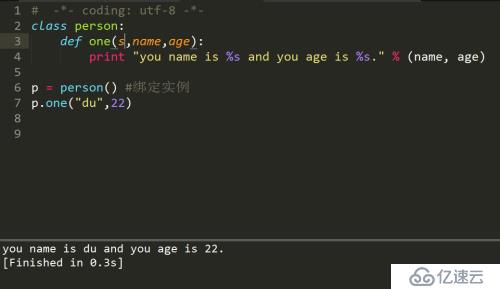溫馨提示×
您好,登錄后才能下訂單哦!
點擊 登錄注冊 即表示同意《億速云用戶服務條款》
您好,登錄后才能下訂單哦!
一,self含義
# -*- coding: utf-8 -*-
class person:
def one(self,name,age):
print "you name is %s and you age is %s." % (name, age)
p = person() #綁定實例
p.one("du",22)執行結果:
you name is du and you age is 22.
其實self可以不必寫成self,但是必須要有一個參數如下圖

詳細了解可以參考博客:http://www.cnblogs.com/jessonluo/p/4717140.html
二,__init__初始化。
# -*- coding: utf-8 -*-
class person:
def __init__(self,sex):
self.sex = sex
def one(self,name,age):
print "you name is %s and you age is %s and sex is %s" % (name, age, self.sex)
p = person("boy") #綁定實例
p.one("du",22)執行結果:
you name is du and you age is 22 and sex is boy
其實就相當于變量sex在類里。比函數大一級別。如下面的程序,和上面的執行結果是一樣的。
# -*- coding: utf-8 -*-
class person:
sex = "boy"
def __init__(self,sex):
#self.sex = sex
pass
def one(self,name,age):
print "you name is %s and you age is %s and sex is %s" % (name, age, self.sex)
p = person("boy") #綁定實例
p.one("du",22)
免責聲明:本站發布的內容(圖片、視頻和文字)以原創、轉載和分享為主,文章觀點不代表本網站立場,如果涉及侵權請聯系站長郵箱:is@yisu.com進行舉報,并提供相關證據,一經查實,將立刻刪除涉嫌侵權內容。